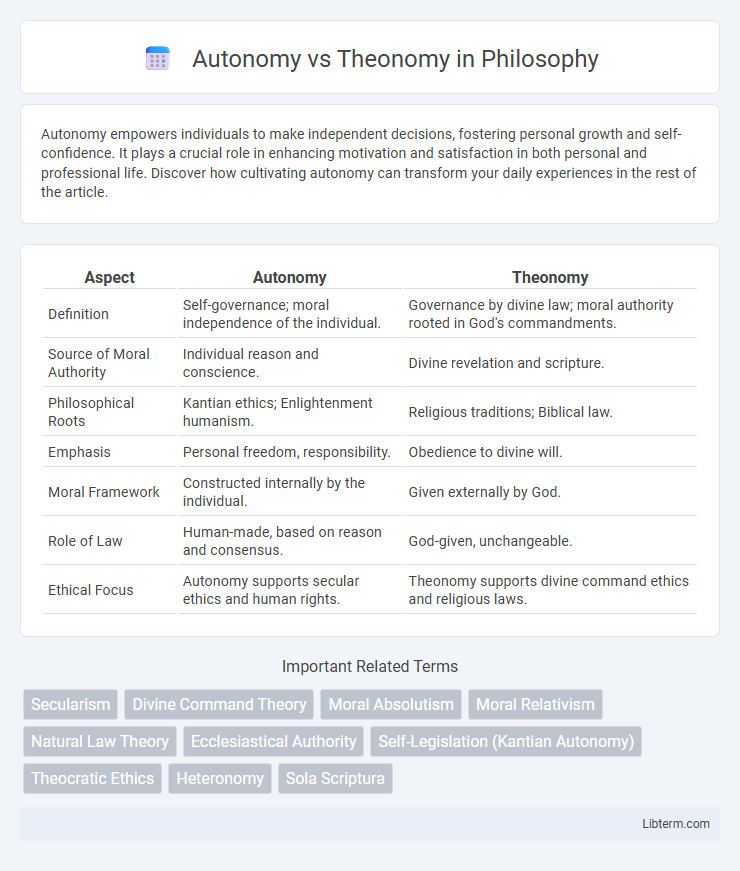Autonomy empowers individuals to make independent decisions, fostering personal growth and self-confidence. It plays a crucial role in enhancing motivation and satisfaction in both personal and professional life. Discover how cultivating autonomy can transform your daily experiences in the rest of the article.
Table of Comparison
| Aspect | Autonomy | Theonomy |
|---|---|---|
| Definition | Self-governance; moral independence of the individual. | Governance by divine law; moral authority rooted in God's commandments. |
| Source of Moral Authority | Individual reason and conscience. | Divine revelation and scripture. |
| Philosophical Roots | Kantian ethics; Enlightenment humanism. | Religious traditions; Biblical law. |
| Emphasis | Personal freedom, responsibility. | Obedience to divine will. |
| Moral Framework | Constructed internally by the individual. | Given externally by God. |
| Role of Law | Human-made, based on reason and consensus. | God-given, unchangeable. |
| Ethical Focus | Autonomy supports secular ethics and human rights. | Theonomy supports divine command ethics and religious laws. |
Understanding Autonomy: Definition and Origins
Autonomy, rooted in the Greek term "auto" meaning self and "nomos" meaning law, refers to the capacity of an individual or group to govern themselves independently without external control. This concept emerged prominently in Enlightenment philosophy, emphasizing personal freedom, self-legislation, and moral self-determination as opposed to externally imposed rules or divine command. Understanding autonomy is crucial in fields like ethics, political theory, and psychology, highlighting the importance of self-governance in human development and societal structures.
Theonomy Explained: Principles and Foundations
Theonomy centers on the belief that divine law, as revealed in sacred scriptures, should govern both individual behavior and societal laws, emphasizing God's sovereignty over civil society. Its principles assert that biblical mandates provide a moral foundation for legislation, promoting justice, social order, and public ethics grounded in divine authority. Theonomic thought challenges secular legal systems by advocating for the integration of God's commandments into all aspects of governance and cultural norms.
Historical Perspectives on Autonomy and Theonomy
Historical perspectives on autonomy and theonomy reveal contrasting worldviews shaping governance and ethical frameworks. Autonomy emerged prominently during the Enlightenment, emphasizing individual self-governance and rational decision-making, while theonomy found roots in ancient and medieval periods where divine law directed societal order. Key figures such as Immanuel Kant championed autonomy as moral self-legislation, whereas early theonomists upheld biblical law as the ultimate authority guiding civil and religious life.
Key Philosophical Debates: Individual Rights vs Divine Law
The debate between autonomy and theonomy centers on whether individual rights or divine law should govern human behavior. Autonomy emphasizes self-governance and personal freedom as fundamental to moral decision-making, while theonomy insists that divine commandments are the ultimate authority that shape ethical and legal systems. Philosophers explore tensions between secular moral frameworks advocating personal liberty and theological perspectives prioritizing obedience to sacred texts.
Autonomy in Modern Secular Societies
Autonomy in modern secular societies emphasizes individual self-governance and moral independence, prioritizing personal freedom over external authority. Legal systems and cultural norms are designed to support autonomous decision-making, fostering environments where diverse beliefs coexist without reliance on divine or religious commands. This autonomy drives progressive social policies and ethical frameworks that reflect collective human reasoning rather than theological doctrine.
Theonomic Influences in Contemporary Governance
Theonomic influences in contemporary governance emphasize the integration of divine law principles into legal and political frameworks, often advocating for legislation that reflects biblical moral standards. This approach challenges secular governance models by promoting laws derived from religious texts as authoritative and binding for societal order. Theonomy's impact is evident in debates over issues like family law, education, and public morality, where religious doctrines inform policy decisions and legislative initiatives.
Moral Authority: Human Reason vs Religious Commands
Moral authority in autonomy emphasizes human reason as the primary source for ethical decision-making, advocating individual conscience and rational reflection to determine right and wrong. Theonomy prioritizes religious commands, asserting divine law as the ultimate moral authority that guides behavior according to sacred texts and theological principles. This contrast highlights a fundamental debate between secular moral reasoning and faith-based ethical obedience.
Case Studies: Societal Outcomes of Both Systems
Case studies comparing autonomy and theonomy reveal distinct societal outcomes shaped by governance structures. Autonomous societies tend to foster individual freedoms and innovation but may struggle with cohesive moral frameworks and social unity. In contrast, theonomous societies often exhibit strong communal values and moral order, though sometimes at the expense of personal liberties and adaptability.
Ethical Dilemmas: Conflicts Between Autonomy and Theonomy
Ethical dilemmas often emerge from the conflict between autonomy, the principle of individual self-governance, and theonomy, the adherence to divine or religious laws as ultimate authority. Autonomy emphasizes personal freedom and moral decision-making based on reason and subjective values, while theonomy prioritizes obedience to externally imposed ethical codes derived from sacred texts or religious traditions. These opposing frameworks generate tensions in legal, medical, and social contexts where individual rights collide with communal or religious obligations.
Future Implications: Balancing Autonomy and Theonomy
Balancing autonomy and theonomy in future governance demands intricate frameworks that respect individual freedoms while upholding collective moral laws rooted in religious or ethical traditions. Advances in artificial intelligence and bioethics will challenge societies to delineate boundaries where personal decision-making aligns with overarching theonomic principles to avoid ethical relativism or authoritarianism. The sustainable integration of autonomy and theonomy can foster social cohesion and legal clarity, ensuring technological and cultural progress harmonizes with enduring moral values.
Autonomy Infographic

 libterm.com
libterm.com